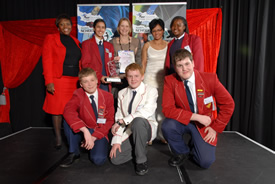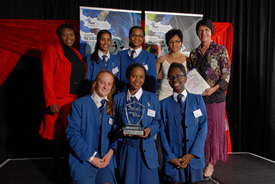| 91% of readers strongly agree that social media platforms could play a key role in attracting younger generations of South Africans to SET fields of study. | |
| 3% say they are not sure (too many learners still don’t have internet access). | |
| 6% disagree (the time and money could be better spent on outreach projects). |
It’s like a real-life movie ... Scientists plan to smash a spacecraft into an asteroid - so they are prepared for the possibility they will have to stop one hurtling towards Earth. The news came as Nasa moved to calm fears that a comet is on a collision course with our planet. Read more
IN THE NEWS
For words so good you could eat them …
 |
The winning team from Hudson Park High School in the Eastern Cape with SAASTA and government representatives. Standing, from left: Nontombi Marule, Deputy Director: Emerging Research Areas, DST; Anisha Dhaya; Ronwyn Pearce, Educator; Beverley Damonse, Executive Director, SAASTA; and Zanele Potwela. Seated are Gareth Meyer, Luke Hannan and Dylan Thomson. |
|
 |
In second place was Mafikeng High in the North West. Standing, from left: Nontombi Marule, Deputy Director: Emerging Research Areas DST; Vineeth Varughese John; Beverley Damonse; JM Pitseng, Educator; and Onalera Kutlwano Phiri. Seated, from left: Kiran George Varghese; Dimpho Moletsane; and Vuyane Eric Ngwenya. |
|
 |
In third place was St Mary's DSG Kloof, from KwaZulu-Natal. Standing, from left: Nontombi Marule, Deputy Director: Emerging Research Areas DST; Celeste Brijlall; Buntu Sipuzi; Beverley Damonse; and Sally Walsh, Educator. Seated, from left: Katie Brazier; Nothando Duma; and Tima Anwana. |
|
… look no further than the debating team from Hudson Park High School in the Eastern Cape, which won the SAASTA National Schools Debates Competition in August.
Five learners from Hudson Park High School proved convincingly that science isn’t something only scientists and the government should be talking about. The young team was victorious in the national finals of the SAASTA National School Debates competition held at the Holiday Inn in Sandton on 26 and 27 August 2011.
The winning schools of each of the nine provincial rounds met in the finals to determine who would walk away with the title of SAASTA National Debate Champions and (better still) the top prize of a trip to New York City next year. The learners were challenged to address three complex topics: the relevance and impact of biotechnology and biodiversity; nanotechnology and the hydrogen fuel economy; and palaeontology. They presented well-formulated arguments that considered aspects of the influence and impact of science on society.
The winning team was announced at an awards dinner on 27 August. Speaking at the event, Beverley Damonse, Executive Director of SAASTA, encouraged the learners as future leaders of the country to spread the message of science communication. She said: “Out of today will come the solutions makers of the future, who will make a better quality of life for us all”.
The SAASTA National School Debates aims to build a generation of communicators who will be able to help counter the misinformation and misconceptions that often form part of debates on scientific topics. Debating about science challenges the youth to explore the relevance of science to themselves and their communities. It provides an ideal tool to engage learners on scientific issues and expose them to the scientific research that happens on our doorstep.
The competition is funded by SAASTA, along with the Department of Science and Technology and its related science communication programmes.
